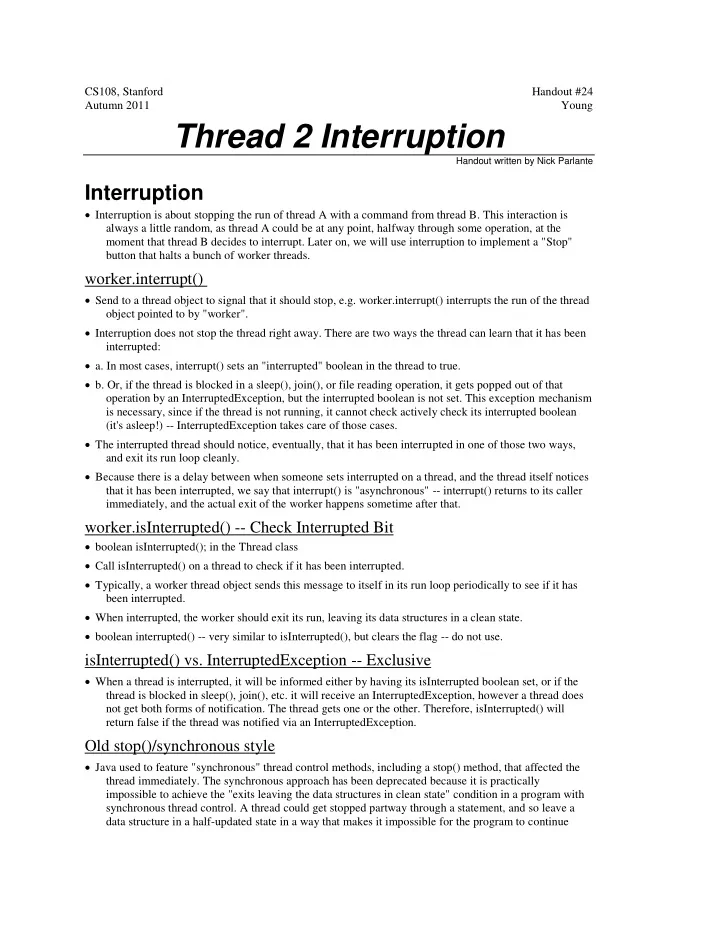

CS108, Stanford Handout #24 Autumn 2011 Young Thread 2 Interruption Handout written by Nick Parlante Interruption Interruption is about stopping the run of thread A with a command from thread B. This interaction is always a little random, as thread A could be at any point, halfway through some operation, at the moment that thread B decides to interrupt. Later on, we will use interruption to implement a "Stop" button that halts a bunch of worker threads. worker.interrupt() Send to a thread object to signal that it should stop, e.g. worker.interrupt() interrupts the run of the thread object pointed to by "worker". Interruption does not stop the thread right away. There are two ways the thread can learn that it has been interrupted: a. In most cases, interrupt() sets an "interrupted" boolean in the thread to true. b. Or, if the thread is blocked in a sleep(), join(), or file reading operation, it gets popped out of that operation by an InterruptedException, but the interrupted boolean is not set. This exception mechanism is necessary, since if the thread is not running, it cannot check actively check its interrupted boolean (it's asleep!) -- InterruptedException takes care of those cases. The interrupted thread should notice, eventually, that it has been interrupted in one of those two ways, and exit its run loop cleanly. Because there is a delay between when someone sets interrupted on a thread, and the thread itself notices that it has been interrupted, we say that interrupt() is "asynchronous" -- interrupt() returns to its caller immediately, and the actual exit of the worker happens sometime after that. worker.isInterrupted() -- Check Interrupted Bit boolean isInterrupted(); in the Thread class Call isInterrupted() on a thread to check if it has been interrupted. Typically, a worker thread object sends this message to itself in its run loop periodically to see if it has been interrupted. When interrupted, the worker should exit its run, leaving its data structures in a clean state. boolean interrupted() -- very similar to isInterrupted(), but clears the flag -- do not use. isInterrupted() vs. InterruptedException -- Exclusive When a thread is interrupted, it will be informed either by having its isInterrupted boolean set, or if the thread is blocked in sleep(), join(), etc. it will receive an InterruptedException, however a thread does not get both forms of notification. The thread gets one or the other. Therefore, isInterrupted() will return false if the thread was notified via an InterruptedException. Old stop()/synchronous style Java used to feature "synchronous" thread control methods, including a stop() method, that affected the thread immediately. The synchronous approach has been deprecated because it is practically impossible to achieve the "exits leaving the data structures in clean state" condition in a program with synchronous thread control. A thread could get stopped partway through a statement, and so leave a data structure in a half-updated state in a way that makes it impossible for the program to continue
2 reliably. e.g. Suppose code was part way through adding a new link to a doubly-linked list. For this reason the whole synchronous "stop" style is being phased out (not just in Java) StopWorker Example /* Demonstrates creating a couple worker threads, running them, interrupting them, and waiting for them to finish. In run(), increments a counter, prints something, and sleeps. Checks for interruption on each iteration. */ public class StopWorker extends Thread { public void run() { long sum = 0; int count = 500; int i; for (i=0; i<count; i++) { sum = sum + i; // do some work System. out .println(getName() + " " + i); // 1. Check interrupted boolean -> break if (isInterrupted()) { // clean up, exit when interrupted // (getName() returns a default name for each thread) System. out .println(getName() + " interrupted"); break ; } // 2. Sleep a little (simulate doing something slow) // InterruptedException -> break try { Thread. sleep (1); } catch (InterruptedException ex) { break ; } // We notice we are interrupted either // because isInterrupted() is true or because // we get an InterruptedException. } // Notice if we exited the loop due to interruption. if (i < count) { System. out .println(getName() + " interrupted " + i); } } public static void main(String[] args) { StopWorker a = new StopWorker(); StopWorker b = new StopWorker(); System. out .println("Starting..."); a.start(); b.start(); try { Thread. sleep (100); // sleep a little, so they make some progress } catch (InterruptedException ignored) {} System. out .println("Sending interrupt()"); a.interrupt(); b.interrupt(); try { a.join(); b.join(); }
3 catch (InterruptedException ignored) { // could get here if someone interrupted the main() thread } System. out .println("All done"); } /* Starting... Thread-0 0 Thread-1 0 Thread-0 1 Thread-1 1 Thread-0 2 Thread-1 2 Thread-0 3 ... Thread-1 116 Thread-0 117 Thread-1 117 Sending interrupt() Thread-0 interrupted 117 Thread-1 118 Thread-1 interrupted 118 All done */ }
Recommend
More recommend